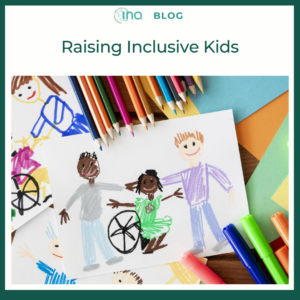 Raising kids is one of the most challenging but rewarding parts of life. Parents have an incredible job of learning who their kids are, guiding them to find their purpose and passions in life. Along with this is raising kids that are not only aware of who they are, but how they can include, appreciate, and be gracious to others along their life’s journey. Here are some tips for raising inclusive kids.
Raising kids is one of the most challenging but rewarding parts of life. Parents have an incredible job of learning who their kids are, guiding them to find their purpose and passions in life. Along with this is raising kids that are not only aware of who they are, but how they can include, appreciate, and be gracious to others along their life’s journey. Here are some tips for raising inclusive kids.
#1: Show them what inclusivity means.
It might not seem like it, but your kids are watching your every move. They see how you interact with other people, how you take care of people around you, and what you say about people when they’re not there. Inclusivity begins with modeling what it looks like. Hold the door open for people, offer to make a meal for someone who is sick or recovering from surgery, or talk positively about people that may come from a different background or are in a disadvantageous situation. If you are a positive model of inclusivity, your kids will see that repeating the same behavior is good and worthwhile.
#2: Keep the dialogue going.
Your kids can’t learn without asking questions. So, encourage them, letting them know that they don’t have to be embarrassed about what they aren’t sure about. Meeting new people that are different from them can feel overwhelming for a child and encouraging them to communicate rather than stay quiet is important to learning more about how others think and feel. Silence does not promote inclusivity, so keep encouraging them to ask questions about diversity.
#3: Highlight similarities.
While each person is unique, there are similarities that can be connected, too. As your kids meet new people, help them to highlight what things they might have in common. Maybe they have similar hobbies, or they like the same music or books. Connecting similarities shows that we are all humans and that in the end, and that they really aren’t as different as they might think.
#4: Give them opportunities.
Talking about inclusivity is the first step but giving kids opportunities to participate in real-life opportunities is the best way to educate them. In addition to participating in school activities or extracurricular events, volunteer in and around the community. This helps your kids meet new people, while giving them a bigger picture idea of how they can do their part to make an impact in the world. Some ideas include helping serve food at a local shelter, cleaning up trash at a local park, or writing letters to elderly citizens or disabled veterans.
Raising inclusive kids is important and if they know that they have a safe space to ask questions and learn, then you are giving them a space to grow into adults that are compassionate and empathetic to every person, regardless of who they are.
